How’s the empathy going?
Thanksgiving, even though it was weird and undersized and confusingly intermingled with Christmas decorations, helped give me a little shove in the right direction. I found out today that gratitude and empathy do seem to have some overlap (as do most other positive feelings), so that’s something to remember in the judgey weeks and months ahead.
And oh, how judgey they will be. Not even because of all the impending political noise and COVID anxiety, but because if I’m not being vigilant and intentional—if I’m not going out there positively scouring my soul for empathy—even in the BEST of circumstances, I can be a real Judgey McJudgeFace.
Two weeks ago I wrote about how I think that’s not going to be helpful for us as a civilization, and last week I talked about how having some passing knowledge of psychology helps me when my empathy reserves are low.
For Part II, let’s talk about playing empathy offense rather than empathy defense.
When you think of having more empathy, you’re mostly thinking about managing your reactions to people, right? You’d like to encounter someone whistling in the grocery store and be able to shift from Ah, a complete psychopath, to Ah, someone who wishes to share the song of his heart, within a few seconds.
And that is a great and noble ambition. You can also, however, take steps to raise your empathetic baseline, so that instead of needing to talk yourself off of the judgment cliff every time you log in to Twitter, you may be able to stop climbing up there in the first place.
I have two suggestions for raising your resting levels of empathy, and the first is to read more fiction.
This is pretty well-known information in the English education world, but people who read fiction are more likely to feel empathy toward other people. The mechanism for this isn’t the genre or plot or even the quality of the writing, but simply narration that allows you to enter the thoughts of at least one character.
So, basically all fiction not written by my first grader counts. You don’t have to go looking for books that promote empathy or feature characters with particular backgrounds or viewpoints. Any fiction is going to let you into the private fears, neuroses, hopes, stories, and loves of another person, and that is the ground from whence all empathy springs.
I actually prefer nonfiction, in general (*holds up English teacher card for revocation*), but when I start to get grouchy about those people, I try to remember to put more fiction in my reading lineup. It makes a difference—once the fictional empathy starts flowing, I start looking at all the real people I encounter as having a backstory, too.
My second suggestion for raising your empathetic baseline is to try some empathy-focused meditation. There are many different kinds from many different traditions (you can just Google empathy meditation), but the gold standard is Metta, the Buddhist loving-kindness meditation.
You should definitely watch Sharon Salzberg explain it rather than take my word for it (and Headspace has a rundown here too), but basically, you wish happiness first to yourself, then to people you love, then to people you feel neutral about, then to people you struggle with, then to people you hope will be recruited to colonize Mars.
There’s no outward product to loving-kindness meditation. You never actually talk to the people you’re envisioning or write them heartfelt notes or anything like that. The entire exercise is focused on softening your own heart, in the hopes that you’ll begin to internalize that posture of kindness and extend it to everyone you meet, jerks and non-jerks alike.
Neither of these strategies are super exciting, but if your empathy needle tends to drift back toward A PLAGUE ON BOTH YOUR HOUSES the way mine does, I can confirm that they both help. I notice an increase in my empathy even just a few pages into reading a novel or a few minutes into loving-kindness, but I also know their effects are cumulative—keeping up with reading and meditating makes me kinder and less reactive overall.
And, AND, I know that their effects are collective. These aren’t highly visible or, seemingly, highly useful actions to take when the dumpsters of the world are burning. But if enough of us make a concerted effort to prime our hearts and brains for empathy, our conversations will be better, our posts will be better, and our relationships will be better. And if all those things are better, our entire collective emotional output will be better. It’s like The Butterfly Effect only with nice things.
Let’s get better.


